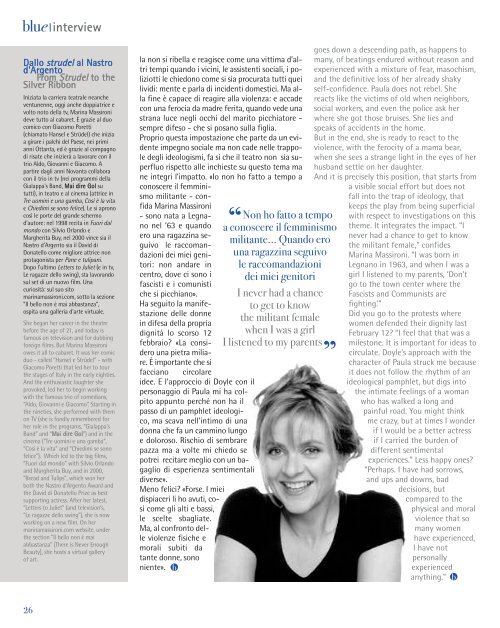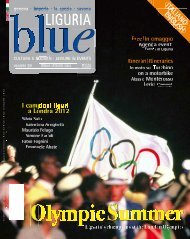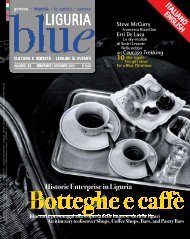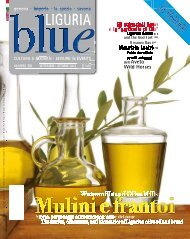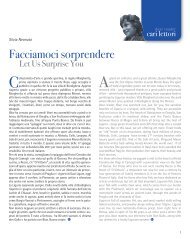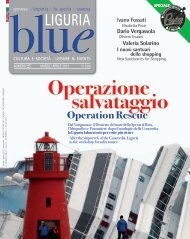cover - Blue Liguria - Sagep
cover - Blue Liguria - Sagep
cover - Blue Liguria - Sagep
Create successful ePaper yourself
Turn your PDF publications into a flip-book with our unique Google optimized e-Paper software.
lue<br />
interview<br />
Dallo ssttrruuddeell al Nastro<br />
d'Argento<br />
From SSttrruuddeell to the<br />
Silver Ribbon<br />
Iniziata la carriera teatrale neanche<br />
ventunenne, oggi anche doppiatrice e<br />
volto noto della tv, Marina Massironi<br />
deve tutto al cabaret. È grazie al duo<br />
comico con Giacomo Poretti<br />
(chiamato Hansel e Strüdel) che inizia<br />
a girare i palchi del Paese, nei primi<br />
anni Ottanta, ed è grazie al compagno<br />
di risate che inizierà a lavorare con il<br />
trio Aldo, Giovanni e Giacomo. A<br />
partire dagli anni Novanta collabora<br />
con il trio in tv (nei programmi della<br />
Gialappa's Band, Mai dire Gol su<br />
tutti), in teatro e al cinema (attrice in<br />
Tre uomini e una gamba, Così è la vita<br />
e Chiedimi se sono felice). Le si aprono<br />
così le porte del grande schermo<br />
d'autore: nel 1998 recita in Fuori dal<br />
mondo con Silvio Orlando e<br />
Margherita Buy, nel 2000 vince sia il<br />
Nastro d'Argento sia il David di<br />
Donatello come migliore attrice non<br />
protagonista per Pane e tulipani.<br />
Dopo l'ultimo Letters to Juliet (e in tv,<br />
Le ragazze dello swing), sta lavorando<br />
sul set di un nuovo film. Una<br />
curiosità: sul suo sito<br />
marinamassironi.com, sotto la sezione<br />
"Il bello non è mai abbastanza",<br />
ospita una galleria d'arte virtuale.<br />
She began her career in the theatre<br />
before the age of 21, and today is<br />
famous on television and for dubbing<br />
foreign films. But Marina Massironi<br />
owes it all to cabaret. It was her comic<br />
duo - called “Hansel e Strüdel” - with<br />
Giacomo Poretti that led her to tour<br />
the stages of Italy in the early eighties.<br />
And the enthusiastic laughter she<br />
provoked, led her to begin working<br />
with the famous trio of comedians,<br />
“Aldo, Giovanni e Giacomo”. Starting in<br />
the nineties, she performed with them<br />
on TV (she is fondly remembered for<br />
her role in the programs, “Gialappa's<br />
Band” and “Mai dire Gol”) and in the<br />
cinema (“Tre uomini e una gamba”,<br />
“Così è la vita” and “Chiedimi se sono<br />
felice”). Which led to the big films,<br />
“Fuori dal mondo” with Silvio Orlando<br />
and Margherita Buy, and in 2000,<br />
“Bread and Tulips”, which won her<br />
both the Nastro d'Argento Award and<br />
the David di Donatello Prize as best<br />
supporting actress. After her latest,<br />
“Letters to Juliet” (and television’s,<br />
“Le ragazze dello swing”), she is now<br />
working on a new film. On her<br />
marinamassironi.com website, under<br />
the section "Il bello non è mai<br />
abbastanza" [There is Never Enough<br />
Beauty], she hosts a virtual gallery<br />
of art.<br />
26<br />
dita definitiva di un’autostima già vacillante. Paula<br />
non si ribella e reagisce come una vittima d’altri<br />
tempi quando i vicini, le assistenti sociali, i poliziotti<br />
le chiedono come si sia procurata tutti quei<br />
lividi: mente e parla di incidenti domestici. Ma alla<br />
fine è capace di reagire alla violenza: e accade<br />
con una ferocia da madre ferita, quando vede una<br />
strana luce negli occhi del marito picchiatore -<br />
sempre difeso - che si posano sulla figlia.<br />
Proprio questa impostazione che parte da un evidente<br />
impegno sociale ma non cade nelle trappole<br />
degli ideologismi, fa sì che il teatro non sia superfluo<br />
rispetto alle inchieste su questo tema ma<br />
ne integri l’impatto. «Io non ho fatto a tempo a<br />
conoscere il femminismo<br />
militante - con-<br />
fida Marina Massironi<br />
- sono nata a Legnano<br />
nel ‘63 e quando<br />
ero una ragazzina seguivo<br />
le raccomandazioni<br />
dei miei genitori:<br />
non andare in<br />
centro, dove ci sono i<br />
fascisti e i comunisti<br />
che si picchiano».<br />
Ha seguito la manifestazione<br />
delle donne<br />
in difesa della propria<br />
dignità lo scorso 12<br />
febbraio? «La considero<br />
una pietra miliare.<br />
È importante che si<br />
facciano circolare<br />
idee. E l’approccio di Doyle con il<br />
personaggio di Paula mi ha colpito<br />
appunto perché non ha il<br />
passo di un pamphlet ideologico,<br />
ma scava nell’intimo di una<br />
donna che fa un cammino lungo<br />
e doloroso. Rischio di sembrare<br />
pazza ma a volte mi chiedo se<br />
potrei recitare meglio con un bagaglio<br />
di esperienza sentimentali<br />
diverse».<br />
Meno felici? «Forse. I miei<br />
dispiaceri li ho avuti, così<br />
come gli alti e bassi,<br />
le scelte sbagliate.<br />
Ma, al confronto delle<br />
violenze fisiche e<br />
morali subiti da<br />
tante donne, sono<br />
niente».<br />
“ Non<br />
ho fatto a tempo<br />
a conoscere il femminismo<br />
militante... Quando ero<br />
una ragazzina seguivo<br />
le raccomandazioni<br />
dei miei genitori<br />
I never had a chance<br />
to get to know<br />
the militant female<br />
when I was a girl<br />
I listened to my parents<br />
goes down a descending path, as happens to<br />
many, of beatings endured without reason and<br />
experienced with a mixture of fear, masochism,<br />
and the definitive loss of her already shaky<br />
self-confidence. Paula does not rebel. She<br />
reacts like the victims of old when neighbors,<br />
social workers, and even the police ask her<br />
where she got those bruises. She lies and<br />
speaks of accidents in the home.<br />
But in the end, she is ready to react to the<br />
violence, with the ferocity of a mama bear,<br />
when she sees a strange light in the eyes of her<br />
husband settle on her daughter.<br />
And it is precisely this position, that starts from<br />
a visible social effort but does not<br />
fall into the trap of ideology, that<br />
”<br />
keeps the play from being superficial<br />
with respect to investigations on this<br />
theme. It integrates the impact. “I<br />
never had a chance to get to know<br />
the militant female,” confides<br />
Marina Massironi. “I was born in<br />
Legnano in 1963, and when I was a<br />
girl I listened to my parents, ‘Don’t<br />
go to the town center where the<br />
Fascists and Communists are<br />
fighting.’”<br />
Did you go to the protests where<br />
women defended their dignity last<br />
February 12? “I feel that that was a<br />
milestone. It is important for ideas to<br />
circulate. Doyle’s approach with the<br />
character of Paula struck me because<br />
it does not follow the rhythm of an<br />
ideological pamphlet, but digs into<br />
the intimate feelings of a woman<br />
who has walked a long and<br />
painful road. You might think<br />
me crazy, but at times I wonder<br />
if I would be a better actress<br />
if I carried the burden of<br />
different sentimental<br />
experiences.” Less happy ones?<br />
“Perhaps. I have had sorrows,<br />
and ups and downs, bad<br />
decisions, but<br />
compared to the<br />
physical and moral<br />
violence that so<br />
many women<br />
have experienced,<br />
I have not<br />
personally<br />
experienced<br />
anything.”


